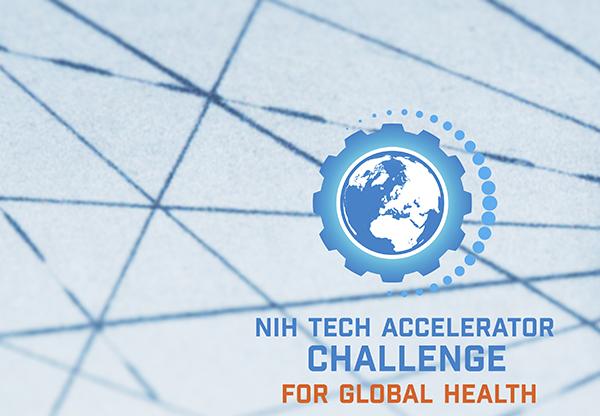Bill & Melinda Gates Foundation to offer supplementary support for designs that can be developed into products on a rapid timeframe

Credit: NIBIB
The National Institutes of Health has launched a $1 million Technology Accelerator Challenge (TAC) to spur the design and development of non-invasive, handheld, digital technologies to detect, diagnose and guide therapies for diseases with high global and public health impact. The Challenge is focused on sickle cell disease, malaria and anemia and is led by NIH’s National Institute of Biomedical Imaging and Bioengineering (NIBIB). The Bill & Melinda Gates Foundation is cooperating with NIH to help accelerate the transformation of design concepts into products for low-resource settings.
NIH will award up to $500,000 for a top finalist and smaller awards to approximately five semi-finalists. The Gates Foundation will separately review winners and honorable mentions and consider them for follow-on support. This may include a grant of up to $500,000 and/or consultations, partnerships for clinical data collection, software development, scale-up, and manufacturing.
“Bioengineers are pioneering the development of cutting-edge, cost-effective, mobile and point-of-care technologies,” said NIBIB Director Bruce Tromberg, Ph.D. “This Challenge is an exciting way to engage and inspire our community to address an urgent health care need.”
Accessible diagnostic tools are essential for providing treatments and cures for some of the world’s highest-burden diseases. While diagnostics currently exist for sickle cell disease, malaria and anemia, they can be challenging to deliver in low-resource settings, particularly at the population level, due to cost, invasiveness and the expertise required to administer the tests. The current TAC is designed to stimulate the development of a platform technology that could be used to rapidly screen large populations as well as provide physicians with a practical tool for optimizing therapy in individual patients.
“While this Challenge is not constrained to any specific technology, the inspiration for it comes from the widespread availability of mobile phones and the potential for mobile phone-linked sensor technologies to non-invasively detect changes in the blood and blood vessels associated with these treatable diseases,” Tromberg said.
For low-resource settings, diagnostics would ideally be portable, self-contained, low-cost, adaptable to multiple diseases, and able to integrate information about the patient and the environment in interpreting the test result.
“New diagnostic tools could address a major burden of disease in low- and middle-income country settings,” said the Gates Foundation’s Dan Wattendorf, Director of Innovative Technology Solutions, Global Health. “Handheld, low-cost tools can bring testing out of a laboratory and to the point of need. Digitally enabled tools can help provide objective guidance for those administering a test, reducing procedural errors and facilitating collection of more complete diagnostic information.”
The Challenge will address three blood disorders that exact an enormous toll on populations around the globe. Sickle cell disease is a group of inherited red blood cell disorders arising from a single genetic mutation that can cause severe pain and potentially lead to premature death. The condition affects millions of people worldwide, most often those of African ancestry. About 300,000 infants each year have sickle cell disease, 75% of whom reside in sub-Saharan Africa. Without newborn screening programs and early diagnosis, 50%-90% of children with the disease in sub-Saharan Africa die before age 5.
Malaria is caused by a parasite that is spread to people through a bite from an infected mosquito. In 2018, approximately 228 million people contracted malaria, with the vast majority of those being in sub-Saharan Africa. The Gates Foundation is committed to implementing new surveillance tools linked to a digital infrastructure with the goal of eradicating malaria entirely.
Anemia affects roughly a third of the world’s population and occurs when the body makes too few red blood cells, destroys too many red blood cells, or loses blood. The most common causes of anemia include iron and other nutritional deficiencies, hemoglobin abnormalities, and infectious diseases, such as malaria, tuberculosis, HIV and parasitic infections. Young children, pregnant women and all women of childbearing age are particularly prone to the effects of anemia.
The Challenge will accept applications through June 2, 2020. Registration for the Challenge and submission of applications are through the Challenge website, https:/
###
Additional partners include the NIH Office of the Director; the National Institute of Allergy and Infectious Diseases; the National Heart, Lung and Blood Institute; the National Institute of Diabetes and Digestive and Kidney Diseases; and the Fogarty International Center.
About the National Institute of Biomedical Imaging and Bioengineering (NIBIB): NIBIB’s mission is to improve health by leading the development and accelerating the application of biomedical technologies. The Institute is committed to integrating engineering and physical science with biology and medicine to advance our understanding of disease and its prevention, detection, diagnosis, and treatment. NIBIB supports emerging technology research and development within its internal laboratories and through grants, collaborations, and training. More information is available at the NIBIB website: http://www.
About the National Institutes of Health (NIH): The National Institutes of Health, the nation’s medical research agency, includes 27 Institutes and Centers and is a component of the U.S. Department of Health and Human Services. NIH is the primary federal agency conducting and supporting basic, clinical, and translational medical research, and is investigating the causes, treatments, and cures for both common and rare diseases. For more information about NIH and its programs, visit http://www.
Media Contact
Raymond MacDougall
[email protected]
301-451-7638
Original Source
https:/




